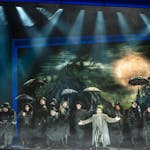If Melvin Whitfield Carter Jr. imagined a future on the right side of the law when he was coming of age in St. Paul's famed Rondo neighborhood, it was working as a deliveryman or somesuch off the back of a truck.
But life had other plans for him.
"I grew up traveling rougher and tougher than was necessary, and bounced my head off quite a few walls," Carter said of his turbulent years fighting in the streets. "I was attracted to action and remember one time, when I was 16, I saved this German kid who was getting beat up. The kid's mom called my mom, and there were tears coming out of the phone. My mom was so proud of me. I really liked that feeling and wanted to feel more of that."
After a stint in the Navy, Carter became a police officer who, over 28 years on the St. Paul force, saved the lives of ordinary citizens and trained generations of officers. Beloved by both the Black and law enforcement communities, Carter is well known in the Twin Cities, where he founded the nonprofit Save Our Sons. His name has now gone national because his son, Melvin Carter III, is the first Black mayor of St. Paul.
Carter pere's life story also is being told onstage. "Diesel Heart," his 2019 autobiography, has been adapted by Brian Grandison into a play that premieres Saturday at St. Paul's History Theatre.
The Star Tribune caught up with the Carters in several interviews recently. The conversations have been edited for length and clarity.
Q: What was it like to be a groundbreaker on the police force?
Carter Jr.: I remember [a deputy chief], who was really cool and engaging, was the first to welcome me. He said, "Mel" — and I don't really like being called Mel but that was the name white people gave me and I tolerated it — "I've never supervised a Black guy before, but I'll tell you this, you're a credit to your people." And he was sincere. I said, "That's the only reason I'm here. And as far as I'm concerned, you're a credit to your people, too."
There was no hostility in the conversation. He and I had one another's humanity. The tough thing in those days was the scale for rating performance was from one to 10, and the unwritten rule was that no Black person could ever get anything higher than five. Ever.
Q: You quit the force after nine years but came back a year later. What happened?
Carter Jr.: The hostility was just overwhelming. I was too surrounded and pinned down by the racist work environment. And I was in such a dangerous place mentally, I didn't want to be running around here angry and armed. I just resigned. So, I sacrificed nine years but even though I came back a rookie and was no longer really promotable, I was a police officer on my own terms. I was here to serve my community rather than trying to have to kiss up.
Q: Has the community been grateful?
Carter Jr.: Still is. I went to get some gas one time and before I knew it, a young man stepped out and paid for my gas. I have people coming out of the woodwork saying I rescued them and I have no recollection of the incidents. Sometimes, when they say that, you might think they mean rescuing them from bad guys but oftentimes they mean from fellow cops. One day I was sitting in a restaurant and I saw the cook staring at me. He finally came out and asked, "They taking care of you?" I said, "Yes. Do I know you?" He said, "Yes, you saved me and my mother when I was 12."
Q: The Carter name means something in St. Paul.
Carter Jr: When [my son] first started running for office, so many people told him they thought they were voting for me, or my dad. And he said to me these words: The best gift he ever got in life was a prepackaged good name.
Carter III: During my first City Council campaign, one of my friends called me, laughing, for she was in the car with her aunt and her grandma, and they passed a Melvin Carter campaign sign and the grandma said, "I grew up with him." The aunt said, "No, I grew up with him." And the daughter said, "I grew up with him!"
Q: Mr. Mayor, what was it like growing up with your father?
Carter III: His book and play remind me of the statement: "You can't see the forest for the trees." Well, I've lived in the trees all my life. So, reading the book is viewing the forest in a way. That one person was adjacent to all these monumental moments in history is almost unbelievable. But his story really is that, from the decimation of Rondo to the evolution in policing to a backstage view of some of the Vietnam War support effort. To think about all the stories that [he] walks through and about the transformation of this community that I now serve is pretty incredible.
Q: What do you feel about someone else portraying you onstage?
Carter Jr.: It's already been surreal. They did a version of this on Zoom a while ago and it activated people I love who I've lost. I think about my two cousins, who were more like siblings, who were taken from me Sunday, April 28, 1974. Double homicide. Talk about something that never leaves you and is unfinished. But I got a chance to see the depiction of my cousin in that Zoom reading. And the night they showed it, I got me a shot [of cognac], because [cousin] Henry and I, we had our first drink at 14 in some alley. Now, in a way, I get to have this one last drink with them. Some things stay raw and open, no matter how much time goes or how hard you bandage it. But in some context, I get to toast my dad, my mom, people I cherish that are gone.
'Diesel Heart'
By: Adapted by Brian Grandison. Directed by Warren Bowles.
Where: History Theatre, 30 E. 10th St., St. Paul.
When: 7:30 p.m. Thu.-Sat., 2 p.m. Sun. Ends April 2.
Tickets: $20-$53. 651-292-4323 or historytheatre.com.





